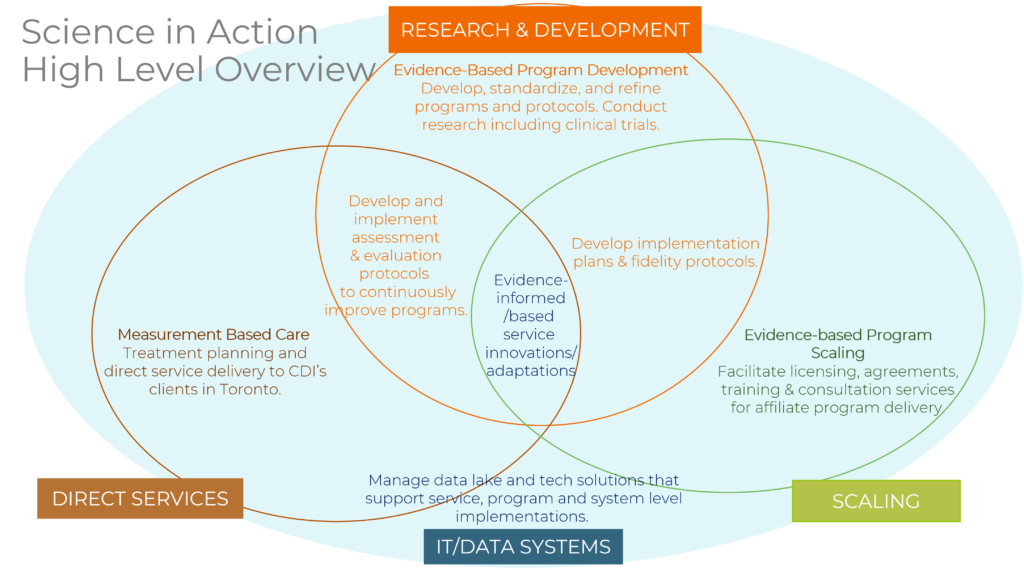Since 1909, CDI has responded to the needs of children, young people, and their families through innovative, compassionate services. On the cutting edge of service delivery, CDI has adopted evidence-informed approaches to delivering high-quality child and youth mental health, early years and child care, and family violence services.

Design Principles
Vision/Mission
The Science in Action (SiA) model is grounded in CDI’s vision “to make a measurable lifelong impact on the mental health and well-being of children, youth and their families.” The SiA model is how we organize and operationalize our work as a recognized leader in developing and delivering world-class, innovative, evidence-based programs to improve children’s mental health and well-being – including taking these programs to scale.
Culture
The SiA Model describes how our interdisciplinary CDI team collaborates to achieve these shared objectives. We are committed to continuing to strengthen an organizational culture which reflects CDI’s core values:
- Service excellence
- Research and evaluation
- Innovation
- Collaboration
- Continuous Learning; Sharing Knowledge
- Diversity
- A Family-Centered Approach
- Responsiveness
- Social Justice
- Accountability
At CDI, Science in Action is fundamentally Who We Are:
We are Collaborating Scientists and Practitioners
- We are expanding the implementation of measurement-based care: we collect data using reliable and validated measures, analyze that data, and use it to inform treatment planning and measure progress. These insights guide continuous improvement across our direct services.
- We use research to inform decision making throughout the organization.
- We share our knowledge through publications, conferences, workshops, academic teaching assignments, and the development of evidence-based programs.
We Practice Science in Action as a Collaborative Process
- We approach our work collectively so that diverse perspectives and paradigms inform our work. We value robust dialogue which challenges our implicit and cognitive biases.
- While we value and respect individual professional expertise, no one in our organization is in solo practice. Our goal is to draw upon multiple perspectives in service planning and delivery and, in the process, develop shared knowledge.
- We structure our organization so that researchers work shoulder to shoulder in collaboration with service delivery.
- We work closely with colleges and universities in conducting research and providing field placements for students.
We are Committed to Continuous Improvement
- We recognize that continuous improvement is central to achieving excellence and is embedded within evidence-based programming and evaluation.
- As innovators, we expect and embrace both successes and failures. We recognize the importance of both to continuous quality improvement.
- We actively encourage a feedback-centric culture where our work individually and collectively is subject to constructive critique for the purpose of continuous learning and improvement.
- When things go wrong, we do not blame individuals or teams but rather examine root causes (e.g., design, environment, training) and seek solutions.
- We use lean methodologies to examine and streamline processes based on an understanding that old ways of doing things, even when they once were cutting edge, may no longer be effective or efficient. We understand that opportunities for process and quality improvement require embracing change.
We are a Learning Organization
- We cultivate a shared vision of who we are at CDI and what we are working to accomplish.
- We incorporate systems thinking into our work across the organization. As innovators and scientist practitioners, we recognize the importance of flexible thinking and utilizing diverse mental models in our work.
- We expect everyone within the organization to be engaged in lifelong learning and contribute to our shared commitment to team learning and organizational development.
